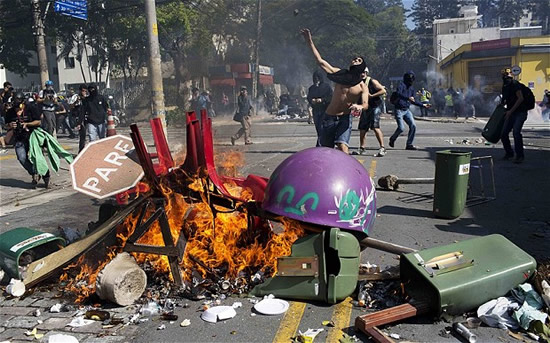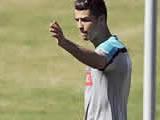World Cup start marred by violence and bloodshed
Friday, June 13, 2014 by Telegraph.co.ukViolence and bloodshed marrs the start of the World Cup in Brazil amid 'unprecedented' scenes of disorder

Unsavoury scenes: Protesters furious at the cost of the World Cup were wounded by rubber bullets
Violence and bloodshed marred the start of the World Cup on Thursday night after protesters and police clashed on the streets of Brazil in “unprecedented” scenes of disorder.
Several people were injured as rubber bullets, tear gas and noise bombs were unleashed to quell civil unrest never before witnessed on the opening day of sport’s biggest event.
In Sao Paulo, a producer for broadcaster CNN suffered a suspected broken arm after being hit with a gas canister and another of its employees was also hurt, while an Associated Press photographer was injured in the leg after a stun grenade exploded near him.
Protesters furious over the billions spent on staging the World Cup were wounded by rubber bullets and could be seen choking on tear gas as police sought to disperse around 300 of them and prevent them cutting off access to the venue for Brazil's match against Croatia.
"I’m totally against the cup,” said Tameres Mota, a university student at the Sao Paulo demonstration. “We’re in a country where the money doesn’t go to the community, and meanwhile we see all these millions spent on stadiums.”
Fellow student Gregory Leao said the demonstrators wanted to invade the Arena Corinthians, adding: “The objective is to put an end to the World Cup. We realise we’re not going to achieve it, but we believe Brazilians should rise up. Brazilians love football but they don’t need this right now.”
Arrests were made and tear gas was also deployed against a similar number of demonstrators marched in central Rio de Janeiro, some of whom burnt Brazilian flags and displayed slogans reading: “Fifa go home.” There were also smaller demonstrations in other host cities.
The World Cup build-up has also been dogged by industrial action, which escalated in Rio yesterday when workers blocked the road leading to the city’s international airport.
The protesting ground staff, who declared a 24-hour partial strike, invaded Avenida Vinte de Janeiro, completely closing it in one direction for around 10 minutes before military police intervened.
Around 25 workers in red T-shirts and carrying red banners flooded onto the busy road, forcing passengers to abandon their vehicles and run toward the airport to catch their flights.
Veterans of previous World Cups said they could not recall such unhappy scenes at the start of an event which usually kicks off amid a carnival atmosphere in the host nation.
One stalwart attending his 10th such tournament told The Daily Telegraph: “This is unprecedented.” Protesters deliberately timed their marches to coincide with the moment the eyes of the world would be on Brazil, having done the same at last summer’s Confederations Cup.
That tournament saw an estimated one million take to the streets to vent their anger against the government and Fifa over the £6.5 billion it cost to bring the World Cup to one of football’s spiritual homes.
Thurdsay’s protests were much smaller and officials will be desperate to prevent them escalating to the levels witnessed 12 months ago.
Seeking the opposite outcome will be anarchist adherents to Brazil’s so-called a Black Bloc’, disciples of the violent form of demonstration and vandalism that emerged in the 1980s in West Germany.
Six police helicopters and hundreds of officers kept protesters at a safe distance from the Arena Corinthians, giving those lucky enough to obtain a ticket for yesterday’s game licence to generate the kind of atmosphere associated with a World Cup.
Fans at the stadium, most of them dressed in the canary yellow and green of Brazil’s national team, chanted, sang and danced in glorious sunshine, with many arriving several hours before kick-off.
There were also signs elsewhere the tournament could yet be embraced by the host nation.
Outside Sao Paulo’s city hall, around 50 signing fans setting off fireworks and blew air horns. “It finally arrived and we are very excited to cheer for Brazil,” said Tuany Ramos.
Despite continued misgivings about a World Cup that has gone massively over budget and has seen several workers die in the rush to complete stadiums, recent polls suggest many Brazilians will start to enjoy it once the football is well under way. In Salvador, another of the 12 cities that will host games, locals were singing and playing drums as others hung yellow and green streamers.
"You can feel the atmosphere building up with fans coming here in good spirits,” said Ben, an England fan in the sweltering Amazon city of Manaus.
Whether the tournament goes smoothly may also have an effect on Brazilian president Dilma Rousseff’s re-election hopes in October.

Legends pay tribute to Gerrard & Lahm
International retirements follow Wo...
- Year
- Winner
- Runner-up
- Third place





